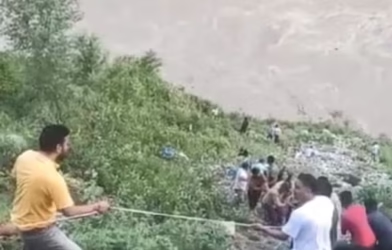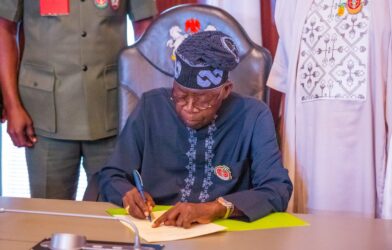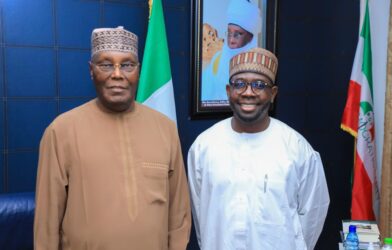181
“Every addiction starts with pain and ends with pain.”- Eckhart Tolle.
“Don’t do drugs because if you do drugs you’ll go to prison, and drugs are really expensive in prison.”- John Hardwick.
As the newly elected President, Bola Ahmed Tinubu, a former governor of Nigeria’s commercial capital of Lagos State, is sworn in to take over the reign of power in Abuja the political capital of Africa’s most populated Country Nigeria on May 29th 2023, one item of interest that people around the World will be expecting from him, is the sustenance of the vigourous war against trafficking of hard drugs and illicit substances that the National Drugs Law Enforcement Agency under the great leadership of the former Lagos State military administrator Brigadier General Muhammed Buba Marwa has been engineering since he was picked by the former President, Muhammadu Buhari of the same All Progressives Congress like his successor.
There is no gainsaying that if a good assessment is done of all the key appointments made in the last two years by the erstwhile President, Major General Muhammadu Buhari (rtd), that of Brigadier-General Mohammed Buba Marwa(rtd) to head the then moribund NDLEA, is certainly a star appointment.
The Chairman of NDLEA has in less than one year, significantly brought many reforms to bear on the operations of the counter narcotics institution in Nigeria which have obviously attracted global acclaim. Hard drug barons who hitherto wielded invincibility, are now on the run even as NDLEA under Marwa has told them to turn a new leaf or be caught because there is no peace for the wicked unless the wicked person repents and does restitution.
Obviously, with the increasing tempo of organised and sophisticated crimes and the high rates of extrajudicial killings of Nigerians by armed terrorists and kidnappers and all sorts of armed freelance hoodlums, robbers, herdsmen, there is therefore the urgency of the now that the incoming President, Bola Ahmed Tinubu, considers giving adequate support and attention to the Marwa led NDLEA so they will even scale up the iconic job of waging battles against drug barons, many of whom this forward looking hierarch of NDLEA, has already caught and are currently prosecuting with some levels of successes. President Bola Ahmed Tinubu needs to work in synergy with the 10th session of the National Assembly to give NDLEA the required legislative template to sustain and even scale up their result oriented war on narcotics.
The 10th National Assembly also must have a proactive and positive attitudes towards supporting and boosting the operations of the NDLEA by first and foremost empowering NDLEA to become financially independent so as to expand their programmes of combating drug abuse and trafficking in Nigeria going forward.
We will later give citation from authenticated statistics of the mileages and landmarks made so far in the counter narcotics war achieved by Marwa and his activist management team. But let’s look at the fundamentals of hard drugs which is the core business of the deadly criminal underworld industry and we will do this by first identifying the basic concepts.
What then is Drug trafficking, we may ask. Fortunately, there are several research findings on this question and the one we readily decided to cite here states that Drug trafficking is a major source of revenue for organised crime groups, many of whom are involved in other forms of serious crime such as firearms, modern slavery and immigration crime. Action against drug trafficking therefore has a much wider disruptive impact on organised criminal activity.
The threat from drug trafficking, says these researchers from www.nationalcrimeagency.org, are multifaceted.
The authors drew their analogy from the consequences of hard drugs trafficking and abuses happening in one of Europe’s biggest markets- United Kingdom.
They wrote that the number of people in this country (UK) whose deaths were caused by drug misuse increased last year. The last official numbers – for 2016 – attributed 2,593 UK deaths to drug misuse. Newer synthetic opioids – such as fentanyl – have contributed to this rise.
Opium production in Afghanistan and cocaine production in Colombia are at record levels. This increase in production has the added effect of a high level of drug purity at street level as the criminals have less need to use cutting agents, and this brings its own dangers. The chemicals necessary for amphetamine production continue to enter the country in volume, while street prices drop, again indicating rising availability. Evidence suggests crack cocaine use – a particular driver of violence -is rising in England and Wales, while demand for all common drug types remain high.
There is significant, and often deadly, competition between rival organised crime groups at all stages of class A drugs production and supply. There is also corruption at every stage of the drug supply chain, including through the use of corrupt port and airport officials.
Organised crime groups involved in drug trafficking are typically also involved in a range of criminal activity, and the profits from illegal drugs are used to fund other forms of criminal operations, including buying illegal firearms and financing terrorism.
Crime associated with drug trafficking is very often violent, with direct links to the criminal use of firearms and gang feud knife attacks, and traffickers frequently exploit young and vulnerable people. Cannabis gangs in particular are notorious for the trafficking and exploitation of Vietnamese children and other vulnerable people to carry out live-in work in dangerous cannabis factories.
Now, this is why President Bola Ahmed Tinubu should focus on combating trafficking of hard drugs abd other affiliated crimes. On 14th November 2021, a report emerged showing that Nigerians are at the verge of suffering immense consequences due to glhard drugs.
Specifically, the 2021 Global Organised Crime Index has ranked Nigeria among the top 10 criminal markets for trafficking in people, firearms, illicit cannabis and heroin trade, fauna crimes, synthetic drugs and non-renewable resource crimes.
The index shows that the countries with the highest criminality levels are those experiencing conflict or fragility, adding that such affected nations were most affected by organised crime.
Governor Mai Mala Buni Welcomes Governor Ben…
According to the report, the Democratic Republic of Congo topped the list of the criminal markets with a score of 7.75, followed by Columbia 7.66; Myanmar 7.59; Mexico 7.56; Nigeria 7.15; Iran 7.10; Afghanistan 7.08; Iraq 7.05; Central African Republic 7.04 and Honduras 6.08.
Other high-scoring countries include Afghanistan, Iraq and Syria, where conflicts have decimated the formal economies, led to mass displacement and an influx of weapons.
The report was authored by the Institute for Security Studies and INTERPOL in affiliation with the Global Initiative against Transnational Organised Crime.
In conflict settings, the GOCI notes that states’ attention and capacities may be diverted to war efforts, leaving social, economic and security institutions weakened, while resilience to organised crime declines.
The lowest-scoring countries with better resilience and social safety include Tuvalu 1.54; Nauru 1.76; Sao Tome & Principe 1.78; Liechtenstein 1.88; Samoa 2.04; Vanuatu 2.20; Marshal Island 2.31; Kiribati 2.35; Luxembourg 2.36 and Monaco 2.43.
The report states, “In breaking down criminality and looking at the 10 criminal markets covered, the global average was slightly lower at 4.65, with human trafficking determined to be the most pervasive worldwide (with a global average of 5.58). Indeed, human trafficking features in the top five criminal markets of every continent in the world. After the trafficking of people, the illicit cannabis trade and arms trafficking were assessed to be the second and third most pervasive markets worldwide, with global averages of 5.10 and 4.92, respectively.”
The index observed that failure on the part of states to provide safe environments and stable economic livelihoods for millions of vulnerable populations created conditions conducive to exploitation, as human traffickers exploit victims for profit both within national borders and abroad through sexual exploitation, forced labour/modern slavery, forced begging, organ trafficking and child soldier recruitment, noting that the vast majority of victims are women and girls.
It affirmed that opportunities for human trafficking have increased with Internet technology, which provides both a ready online market and, simultaneously, the means to exploit people with greater anonymity, adding that human trafficking market is present in a wide range of contexts, from both stable countries to those in conflict, often overlapping with other criminal markets, such as human smuggling.
On the regional level, Asia leads in criminality, criminal markets, criminal actors and resilience followed by Africa, Americas, Europe and Oceania
On the sub-regional level, East Africa leads in criminality followed by West Africa, Central Africa, Northern Africa and Southern Africa.
The Index data further shows that, as with criminal markets, East Africa is home to the most influential criminal actors on the continent, driven predominantly by state-embedded actors.
Overall, state-embedded actors scored 7.22 in the region with Central Africa (7.55) leading the way, followed by North Africa (7.17), West Africa (6.90) and Southern Africa (6.90).
The report reads, “Criminal networks are also prevalent across all regions in Africa, but none more so than in East Africa (6.83) and West Africa (6.43). On the other hand, while Central Africa is home to countries with some of the highest levels of state capture in the world, criminal networks in numerous countries in the region are fairly weak.
“While mafia-style groups are the lowest-scoring criminal actor type across the continent, there are several countries in Africa where highly organised gangs, armed groups and militias yield significant influence in the criminal landscape, many of whom have even been strengthened by the COVID-19 pandemic, capitalising on openings in illicit markets and in doing so consolidating control over the communities in which they operate.”
Happily, the new President who actually paid a visit to NDLEA chairman during the campaign period, now has the opportunity of a lifetime to disprove and debunk the widely held perception that he himself had had a case related to drug trafficking or money laundering connected to drugs in the United States of America. Bola Ahmed Tinubu will do this if he gives unconditional presidential support, solidarity and scale up the political will to wage consistent war against drug barons just as the hierarchy of NDLEA has already started doing.
Marwa has a template of action which his management team is already implementing with maximum successes and these items of actions against drug barons must be escalated and never in anyway sabotaged.
All eyes around the globe are watching this new government to ascertain if what Bola Ahmed Tinubu has consistently said that he has no business or connection to drug business is true or false.
Mr. President, the ball is now in your court to show the World that you mean every words when you denied allegations of your connection to drug in USA.
So the new government must see NDLEA as a front line enforcement body and provide all round support so they attain the lofty heights that Nigerians are looking up to from a charismatic leader like Marwa and his efficient management team members who are some of the most patriotic Nigerians any President can be proud of.
Moreover when Marwa and NDLEA stood by Bola Ahmed Tinubu and also refused to be used to scuttle the chances of Tinubu becoming President, so the new government must support NDLEA to keep winning the tough wars on drugs and associated sophisticated crimes. NDLEA under Marwa robustly kicked against the case instituted by some litigatants who alleged that Bola Ahmed Tinubu has a case of money laundering connected to drugs but for which the accused vigourously denied. This NDLEA under Marwa is indeed doing very well for which I recommend them as positive agents of the renewed hope of President Bola Ahmed Tinubu.
Around January 24, 2022, the NDLEA gave out verifiable statistics of what it has achieved so far. These landmarks are not in doubt as they are empirically verified.
The Chairman and Chief Executive of the National Drug Law Enforcement Agency (NDLEA), Brig-Gen Mohammed Marwa (Rtd), had then, said a total of 12,306 suspects including seven barons were arrested by the operatives of the Agency in connection with an illicit drug in the country in the last one year.
Marwa, while addressing a press conference said the achievements of the agency in the last one year is the best in 30 years.
He said 1,400 offenders were convicted of offences of drug peddling while 1,502 cases were left pending in courts adding that, over 3.4 million kilograms of assorted drugs and cash worth over N130 billion were seized last year.
The NDLEA boss further disclosed that 406 hectares of Cannabis farms were destroyed while 7, 761 drug users were counselled and rehabilitated in NDLEA facilities across the country.
Highlighting some of the spectacular seizures recorded by the Agency since January 2021, Marwa said they include, 230 tons of cannabis in Edo State in February and a recent seizure of over 100 tones of psychotropic substance across the country in the past two weeks, “451, 807 Captagon tablets, weighing 71.119 kg in September at Apapa Seaport, Lagos. This was the first-ever recorded seizure of the drug in the West and Central African regions.
“1,994, 400 capsules of Tramadol in February at the Apapa Port, another 144, 400 bottles of Codeine syrup in March and in October, 32.9 kg of cocaine.
“43.11 kg of cocaine in February at Tin Can Seaport and another 22, 590 kg of Codeine syrup at the Port in September, 4, 996, 200 capsules of Tramadol, weighing 2,498 kg in May at the Onne Port and another interception of 100,000 (100ml) bottles of Codeine cough syrups weighing 15, 325kg in 500 cartons at the port in June.
“In December 2021 alone, over 34, 000 kilograms of cannabis smuggled from Ghana were intercepted at the Eko Atlantic City Beach while more than 8.3million capsules and tablets of Tramadol were seized in Lagos a week before Christmas.
“Just last week, about 1.5million capsules of the same drug loaded in Onitsha, Anambra state heading to Kebbi and Kano were also intercepted by our men in Edo State,” he said.
He said the agency’s series of interceptions and seizures of cocaine and heroin at the Murtala Mohammed International Airport remains the epicentre of the spectacular seizures, including what stands today as the biggest single seizure from an individual in 15 years, which is 26.840kg of cocaine smuggled from Brazil in January, 24.05 kg of Heroin in April, 27.95 kg of Cocaine in May and 26.15kg of Heroin in May last year.
NDLEA boss said that the agency performance led to drug supply reduction, interdiction and reformation of the agency that was underfunded and under staff.
According to him, the structural reform efforts resulted in the creations of new directorates and creation of 14 zonal commands.
General Marwa explained that the reforms in NDLEA, “Could not have come at a better time because the dire findings of the National Drug Use and Health Survey of 2018 was a wake-up call that showed clearly that procrastination was an invitation for a national catastrophe.
“Having 14.3 million Nigerians abusing drugs, with 10.6 million addicted to cannabis portends grave consequences. The administration of President Muhammadu Buhari is the government that read the situation correctly and subsequently took the bold and decisive step to revamp and gird the NDLEA for the task of cleansing Nigeria from the scourge of drug abuse and trafficking of illicit substances.”
Answering questions from newsmen, Marwa said, a special task force is currently working across the country to track and dismantle drug cartels behind the production and distribution of methamphetamine, popularly called Mkpuru Mmiri, being abused by youths in parts of the country.
He challenged communities across Nigeria to take ownership of the war against drug abuse as those in South-East states are doing by standing up to those engaging in abuse and trafficking of illicit drugs.
In his words, “If you look at the preponderance of the dealers in drugs, I am not saying anything new but the South East has the predominance and that is a fact. The greatest efforts by communities to rid the country and their communities of drug use are from the South East. Clearly, in the same South East, they are doing two things; first, they are telling their fellow travellers who are not decent, that look you are the very few who are spoiling our names here. Stop it!
“And more importantly, they are riding their communities of drug abuse, they have taken the ownership of the war against drug abuse especially the Mkpuru-Mmiri,” he said and urged the entire country to take an example of the ownership of the war against drug abuse from the South-East.
Marwa rates NDLEA 2021 performance best in 30 years.
This writer is a living witness of these iconic achievements of Marwa led NDLEA.
Only recently, the NDLEA intercepted a UK-bound N.5Billion worth meth, arrestsled baron, and sealsled Lekki mansion and then seized drug consignment, military uniforms going to Borno; nabs jailbird in Adamawa.
The good news says that the operatives of the National Drug Law Enforcement Agency, NDLEA, have intercepted a large consignment of methamphetamine concealed in powdered custard containers as part of a consolidated cargo going to London, United Kingdom at the SAHCO export shed of the Murtala Muhammed International Airport, MMIA, Ikeja Lagos.
The illicit drug consignment weighing 30.10 kilograms with a street value of N567million was detected and seized by NDLEA operatives at the airport on Tuesday 16th May. This was swiftly followed by series of follow-up operations that led to the arrest of a freight agent, Nwobodo Chidiebere; a female suspect, Chioma Lucy Akuta and ultimately the drug lord behind the shipment, Charles Chinedu Ezeh, who was arrested at Sotel Suites, Amuwo Odofin, Lagos on Thursday 18th May.
Ezeh claims hes a businessman and deals in articles in Onitsha, Anambra State but investigations reveal he lived with his wife and children in London until 10th December 2022 when he fled to Nigeria after his involvement in a drug related offence in the UK.
Though he claimed to have been living in hotels since his return to Nigeria last December, operatives were however able to locate his mansion at No. 1 Hawawu Abikan Street, Lekki, on Friday 19th May, where a search was conducted and his travel and property documents among others were recovered.
Meanwhile, NDLEA operatives in Adamawa on Monday 15th May arrested a 32-year-old notorious drug dealer, Prince Ikechukwu Uzoma, in Mubi area of the state with 1kg of skunk. Ikechukwu had twice been arrested in the past, and convicted for the same offence. He was in 2017 sentenced to six months imprisonment and in 2019 he was again sent to two years in jail. In the same vein, a trans-border trafficker, Faisal Mohammed, 27, was on Wednesday 17th May arrested in Mubi following the interception of a truck from Onitsha, Anambra State, where a total of 2,376 sachets of tramadol comprising 23,760 pills were found concealed in three blue rubber Jerrycans which were hidden underneath the body part of the trailer. The suspect admitted the opioid was to be taken to Cameroon.
In Oyo state, two suspects: Osas Susan, 35, and Thomas Biodun, 23, were arrested at Igbon, Gambari in Ogbomoso North LGA with 2.13kg cannabis while Idris Muhammed, 55, was nabbed with 4,500 pills of tramadol when a commercial bus conveying him and other passengers was stopped and searched along Lagos-Ibadan expressway.
Similarly, Bulus Mikah, 63, was arrested at Kafanchan, Kaduna state with over 5kg opioids including tramadol, diazepam, rohypnol and exol-5, just as a total of 965kg cannabis was seized from Shehu Muhammadu Dandare, 25, at Maraban Jos, in Igabi local government area of the state.
While 552kg cannabis was recovered from a warehouse in a bush when operatives stormed and destroyed 1.5 hectares of cannabis farm in Uhodoua forest, Esan South East LGA, Edo state, 10 suspects were arrested with a total of 5.587kg cannabis sativa, 144.4grams of methamphetamine and 48, 260 capsules of tramadol in different parts of Onitsha, Anambra state on Friday 19th May.
In Kwara, two suspects: Mohammed Isa, 47 and Mohammed Haman, 36, were arrested on Friday 19th May along Ilorin/Lagos road in a commercial bus on their way to Maiduguri, Borno state with 6kg cannabis, 50grams of methamphetamine and 20 pieces of military camouflage caps and uniforms. The same day, operatives in Jigawa state nabbed one Ibrahim Abdullahi, 53, with 120kg cannabis at Sara town in Gwaram LGA.
Not less than 628 bottles of new psychoactive substance, skuchies when operatives raided a drug joint at Idanre where four suspects were arrested. They include: Olamide Olusola, 26; Abiodun Tijjani, 21; Fatope Temidayo, 29; Agba Obi, 30 and Olafisoye Festus, 26. In the same vein, a suspect, Kayode Hakeem, 22, was arrested at Hawan Dawaki, Kano with 293 blocks of cannabis weighing 211.6kg.
Chairman/Chief Executive Officer of NDLEA, Brig. Gen. Mohamed Buba Marwa (Retd) has commended the officers and men of MMIA command for their professionalism and speed with which they were able to track and arrest another drug kingpin, Ezeh Chinedu Charles. He charged them and their colleagues in Adamawa, Oyo, Kaduna, Edo, Kwara, Jigawa, Ondo and Kano as well as those in other commands and formations across the country not to rest on their oars. Femi Babafemi, the Director, Media & Advocacy
NDLEA Headquarters Abuja signed the statement dated Sunday 21st May 2023.
Our wish is that President Bola Ahmed Tinubu should make it tougher for drug traffickers and provide political, funding, administrative, legislative support for NDLEA to ultimately win the tough wars against hard drugs. We must become a drug free nation.
EMMANUEL ONWUBIKO is head of the HUMAN RIGHTS WRITERS ASSOCIATION OF NIGERIA (HURIWA). He was a NATIONAL COMMISSIONER OF THE NATIONAL HUMAN RIGHTS COMMISSION OF NIGERIA.












Comments are closed